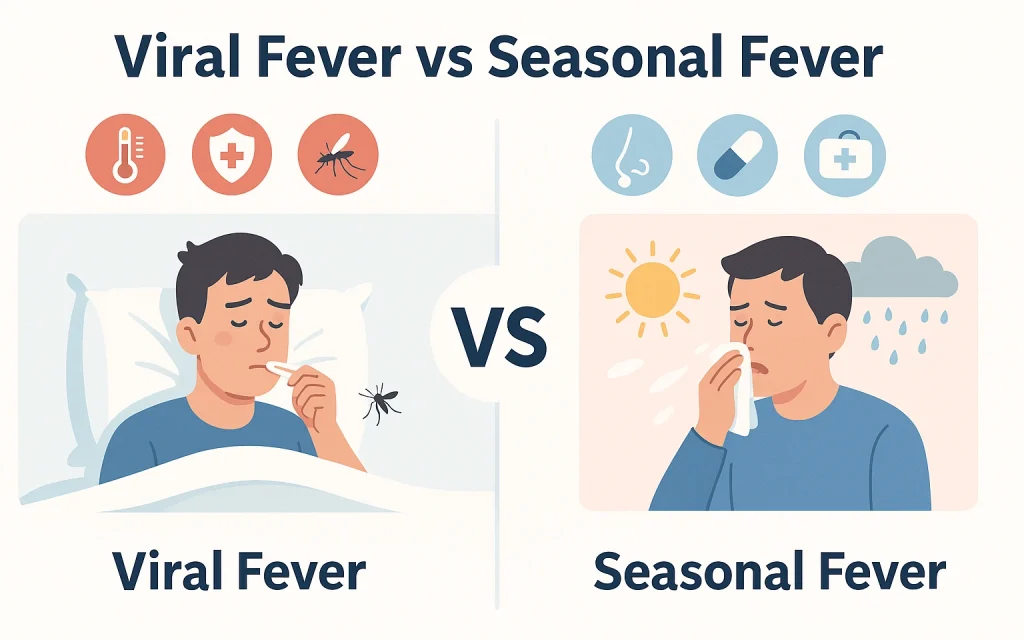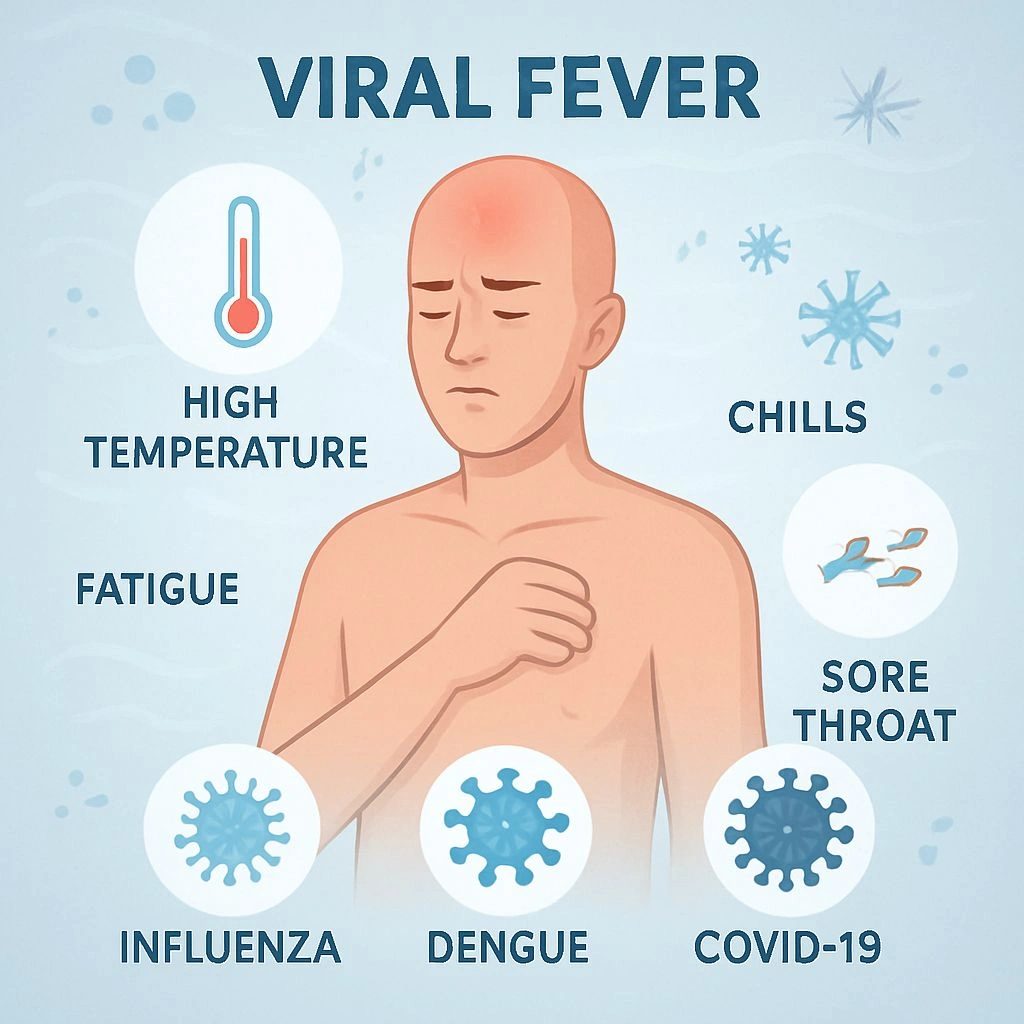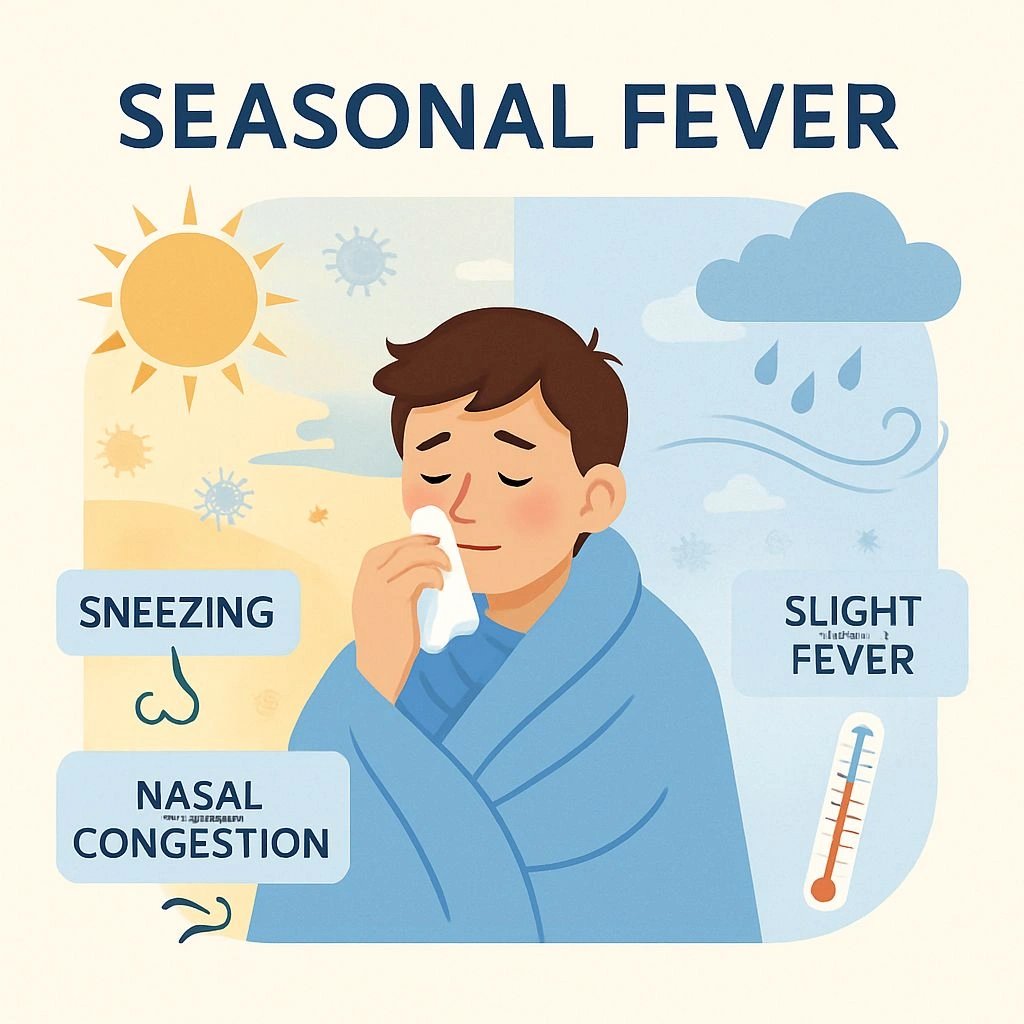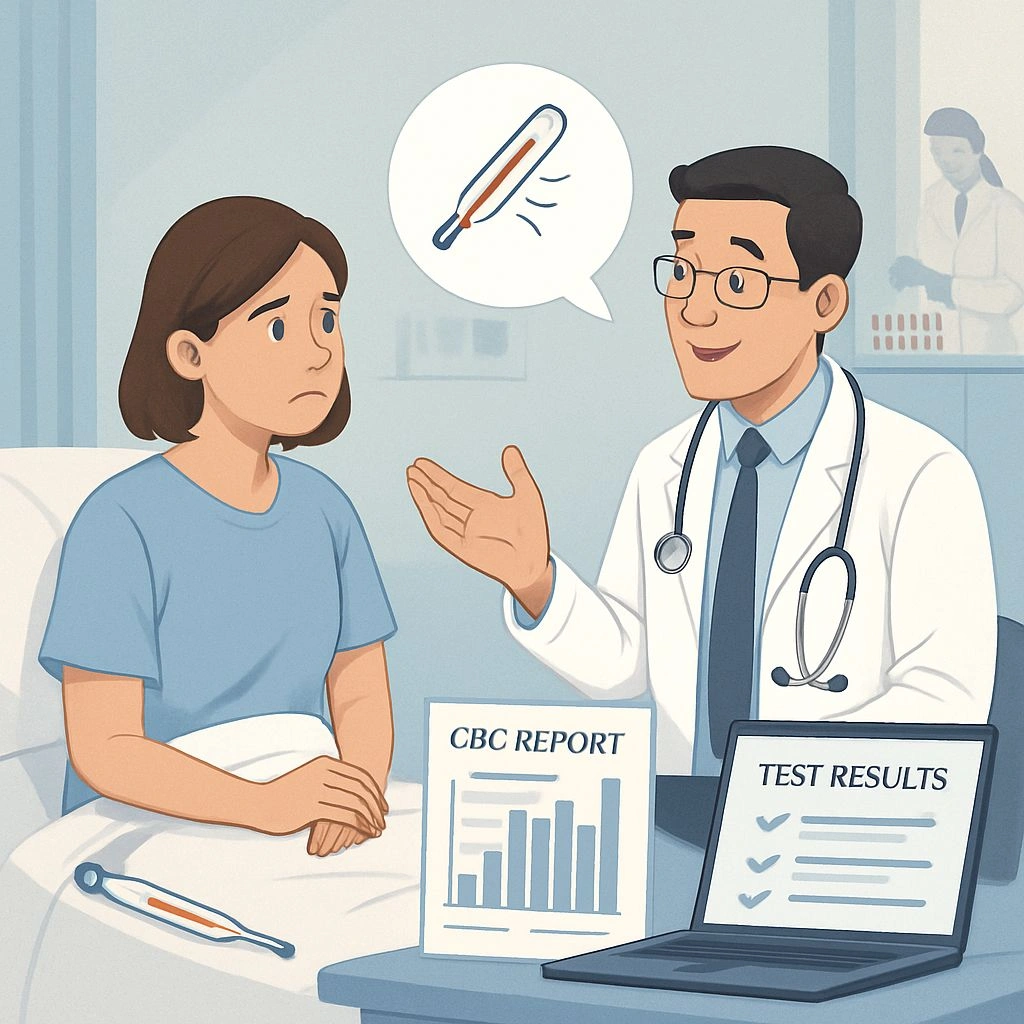
Viral Fever vs Seasonal Fever holds much prominence among searched health terms, During transitions in the weather.
At Gurukripa Hospitals, we believe that knowledge gained timely about various types of fevers expedites recovery, renders the condition free from complications, and allows families to take precautions early on.
Both viral and seasonal fever may appear very similar in the beginning, but they are quite different concerning causes, severity, duration, and in the degree of risk posed. Extraordinary knowledge about these differences will enable one to take care better and decide when to seek professional medical intervention.
Symptoms of Viral Fever vs Seasonal Fever
What is Viral Fever?
Viral fever is a specific type of fever which is due to an infection with a virus. Viral fevers maybe from different causes such as influenza, dengue, RSV, and COVID-19. The condition impacts the body’s various systems and is usually accompanied by body ache, fatigue, and fever.
Viral fevers are easily transmitted as they can be communicated through the air, bodily fluids, contaminated surfaces, and through insect bites.
Some Common Symptoms Of Viral Fever:

- Sudden Fever Spike (100.4°F or higher)
- Continuous Severe
Body and Muscular Pain - Chills Coughing and Sore Throat
- Rashes on Skin (relatively rare)
- Nausea & Diarrhea
What is a Seasonal Fever?
A seasonal fever usually has a lower peak temperature than other flus, and is short in duration. It usually happens during a change in weather, as well as exposure to a very low grade virus.
Seasonal fever may come with sore throats and runny nasals, and may be secondary to allergies and other mild infections or simply due to poor air quality.
Some Symptoms of Seasonal Fever:

- Mild to moderate temperature elevation
- Runny nose or sneezing or nasal congestion
- Dry throat or mild cough
- Headache
- Light body aches
- Generalized tiredness
Difference Between Viral and Seasonal Fever
Although viral and seasonal fever, both have some overlapping common symptoms, the other signs point toward a differential diagnosis. Viral fever is generally more intense while symptoms of seasonal fever are often mild and tend to disappear within 2–3 days.
- Cause: Seasonal fever is caused by a particular change in the weather or the presence of a virus in the air. In contrast, viral fever is triggered from an underlying condition in the body and usually surfaces after a few days.
- Duration: While seasonal fevers often resolve quickly for most patients in hours, viral fevers can persist between six days to a week for others.
- Severity: Viral fevers have a greater degree of complications, so severity is high in comparison to seasonal fevers. Seasonal fevers are generally mild.
- Contagious: Seasonal fever and viral infections are not usually contagious, but viral fever is.
Viral and Seasonal Fever Symptoms Management at Home
If you get a viral fever seasonally, the method is rest, hydration, and catching and treating early symptoms.
Proven Home Remedies for Viral and Seasonal Fever:
Of course, getting better at home starts with the essentials, with a heavy emphasis on ‘done right,’ But here are a few simple-yet-effective Home Remedies for Viral Fever to alleviate some of the symptoms of your fever and create a healing environment:

Gargle of warm salted water: Sounds a little dated, but this remedy is still golden when it comes to alleviating that throat pain and reducing inflammation.
Relieve fever and pain (the right way): Medications such as paracetamol can be taken to relieve pain and reduce fever with, of course, the advice of a doctor. Self-medication could result harmful instead of cure.
Eat light and eat right: Munch on soft-to-digest foods. Think warm soups, plain khichdi, or steamed greens-so that the digestive system is happy while the body heals.
Most fevers will resolve with time and care; however, there are some signs to never ignore for Viral and Seasonal Fever. You need urgent physian consultation if you experience any of the following:
- The fever do not settle even after seventy-two hours
- You are dyspnoeic (short of breath), or in respiratory distress ( you are unable to breathe normally)
- Rashes, that are spreading fast, especially in conjunction with a fever
- Continuous nausea or diarrhea
- Body is weak, lethargic, or faint
- After you appear to be in better health, the fever frequently returns.
- Severe headaches, along with a stiff neck
The highlighted signs could be signs of a more severe infection and need expeditious assessment by a health care for Viral and Seasonal Fever.

We provide a variety of in-house diagnostic services to identify causes of Viral and Seasonal Fever:
- CBC and infection markers
- Dengue, typhoid, and malaria screening
- COVID-19 and flu testing
- Chest X-rays and ultrasound scans if needed
- Stool or urine examination for GI symptoms
Our lab findings are quick, precise, and directed by our experienced medical professionals to provide prompt treatment for Viral and Seasonal Fever.
Treatment Options in Viral Fever
Primarily supportive in nature, the treatment of viral fever would sometimes encounter cases that require pharmaceutical care or hospital care, varying upon the severity of the illness.
The medication treatment options include:
- Antiviral medications for use in viral diseases such as influenza or COVID-19.
- IV fluids to prevent dehydration if vomiting or the fever is high.
- Oxygen therapy if there is any breathing difficulty.
- Hospitalization for high-risk patients or cases of prolonged high fever.
At Gurukripa Hospitals, we determine a treatment plan based upon symptom, age, medical history and the lab tests results.
Preventive Measures for All Fevers
Good hygiene and well maintained immunity in the whole body will be the beginning of prevention of both viral and seasonal fever.
Tips for the prevention of fever:
- Wash your hands frequently with soap
- Avoid direct contact with sick people
- When in busy settings or high-vulnerability zones, wear a mask.
- Mosquito repellent, especially during monsoons
- Keep your surroundings tidy and prevent standing water from forming.
- Go on and include ancient medicines for immunity in your daily market list, for example, vitamin C, zinc, etc.
Conclusion:
Recognizing Viral Fever vs Seasonal Fever is important during times of weather change. Weather change spurs an increase in viral and other infection cases at places such as Sikar, where the monsoon and winter seasons create spikes in cases. At Gurukripa Hospitals, we aim to see that every patient has a chance of receiving the correct diagnosis and treating at the right time.
If you are uncertain about the symptoms; or the fever does not feel like a “wait-out,” don’t wait. No matter if it’s something minor or more serious; we do have doctors, emergency, and fully staffed and equipped imaging labs at the hospital 24×7.
Take action early. Stay informed. And remember – your health deserves attentation.
Frequently Asked Questions (FAQs):
A. The viral fever is normally severe as it is prolonged, accompanied by chills or body aches. The seasonal fever is light and subsides within 2 or 3 days.
A. Yes, one must treat simple viral fevers with rest, lots of fluids, and symptomatic treatment at home. The more serious ones need to consult a doctor for treatment.
A. Yes, viral infections do spread, through contact, either by droplets or otherwise. The best time to seek isolation is when symptoms are at their worst.
A. The antibiotics never work against viruses and should be prescribed only if a bacterial infection is diagnosed.
A. Yes. Children, elderly, and those with chronic disease should get early medical attention, as they are highly susceptible.





